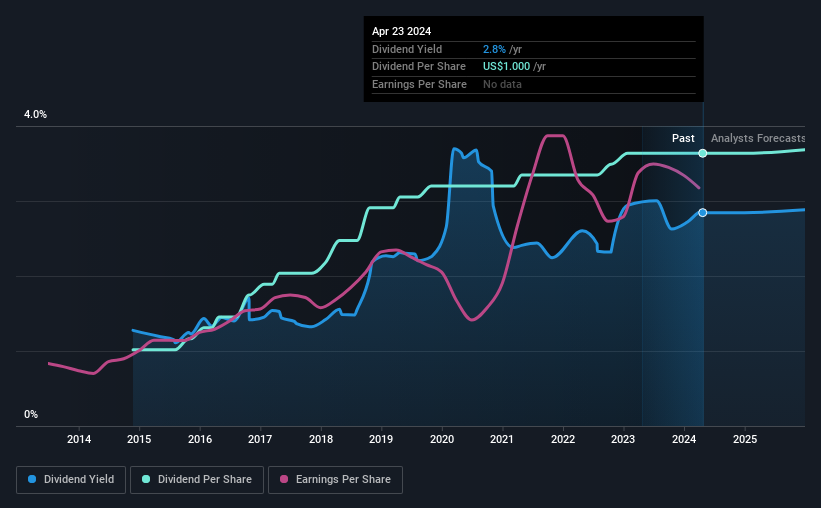Stock Analysis
- United States
- /
- Banks
- /
- NasdaqGS:HBCP
Should You Buy Home Bancorp, Inc. (NASDAQ:HBCP) For Its Upcoming Dividend?

Regular readers will know that we love our dividends at Simply Wall St, which is why it's exciting to see Home Bancorp, Inc. (NASDAQ:HBCP) is about to trade ex-dividend in the next two days. Typically, the ex-dividend date is one business day before the record date which is the date on which a company determines the shareholders eligible to receive a dividend. It is important to be aware of the ex-dividend date because any trade on the stock needs to have been settled on or before the record date. In other words, investors can purchase Home Bancorp's shares before the 26th of April in order to be eligible for the dividend, which will be paid on the 10th of May.
The company's next dividend payment will be US$0.25 per share, on the back of last year when the company paid a total of US$1.00 to shareholders. Calculating the last year's worth of payments shows that Home Bancorp has a trailing yield of 2.8% on the current share price of US$35.15. Dividends are an important source of income to many shareholders, but the health of the business is crucial to maintaining those dividends. We need to see whether the dividend is covered by earnings and if it's growing.
Check out our latest analysis for Home Bancorp
If a company pays out more in dividends than it earned, then the dividend might become unsustainable - hardly an ideal situation. Home Bancorp paid out just 21% of its profit last year, which we think is conservatively low and leaves plenty of margin for unexpected circumstances.
Companies that pay out less in dividends than they earn in profits generally have more sustainable dividends. The lower the payout ratio, the more wiggle room the business has before it could be forced to cut the dividend.
Click here to see the company's payout ratio, plus analyst estimates of its future dividends.

Have Earnings And Dividends Been Growing?
Businesses with strong growth prospects usually make the best dividend payers, because it's easier to grow dividends when earnings per share are improving. If earnings decline and the company is forced to cut its dividend, investors could watch the value of their investment go up in smoke. This is why it's a relief to see Home Bancorp earnings per share are up 6.1% per annum over the last five years.
The main way most investors will assess a company's dividend prospects is by checking the historical rate of dividend growth. Home Bancorp has delivered an average of 15% per year annual increase in its dividend, based on the past nine years of dividend payments. It's encouraging to see the company lifting dividends while earnings are growing, suggesting at least some corporate interest in rewarding shareholders.
Final Takeaway
From a dividend perspective, should investors buy or avoid Home Bancorp? It has been growing its earnings per share somewhat in recent years, although it reinvests more than half its earnings in the business, which could suggest there are some growth projects that have not yet reached fruition. Overall, Home Bancorp looks like a promising dividend stock in this analysis, and we think it would be worth investigating further.
In light of that, while Home Bancorp has an appealing dividend, it's worth knowing the risks involved with this stock. Our analysis shows 2 warning signs for Home Bancorp that we strongly recommend you have a look at before investing in the company.
A common investing mistake is buying the first interesting stock you see. Here you can find a full list of high-yield dividend stocks.
Valuation is complex, but we're helping make it simple.
Find out whether Home Bancorp is potentially over or undervalued by checking out our comprehensive analysis, which includes fair value estimates, risks and warnings, dividends, insider transactions and financial health.
View the Free AnalysisHave feedback on this article? Concerned about the content? Get in touch with us directly. Alternatively, email editorial-team (at) simplywallst.com.
This article by Simply Wall St is general in nature. We provide commentary based on historical data and analyst forecasts only using an unbiased methodology and our articles are not intended to be financial advice. It does not constitute a recommendation to buy or sell any stock, and does not take account of your objectives, or your financial situation. We aim to bring you long-term focused analysis driven by fundamental data. Note that our analysis may not factor in the latest price-sensitive company announcements or qualitative material. Simply Wall St has no position in any stocks mentioned.
About NasdaqGS:HBCP
Home Bancorp
Home Bancorp, Inc. operates as the bank holding company for Home Bank, National Association that provides various banking products and services in Louisiana, Mississippi, and Texas.
Flawless balance sheet and undervalued.

